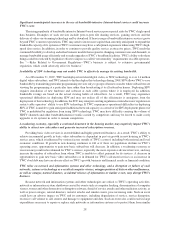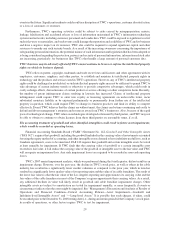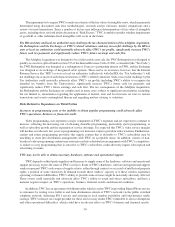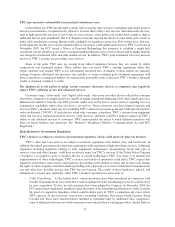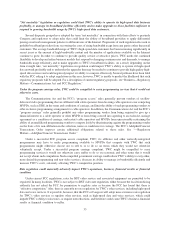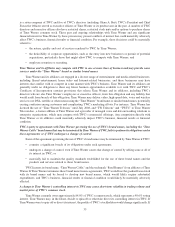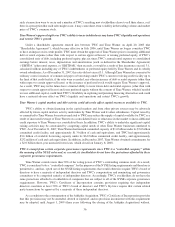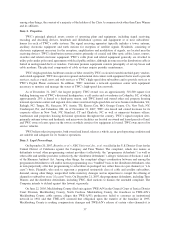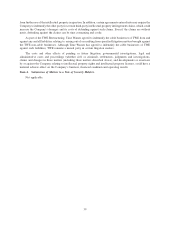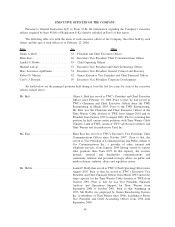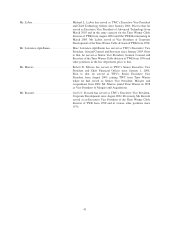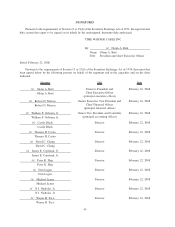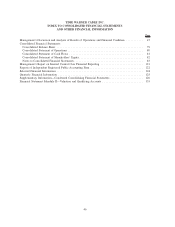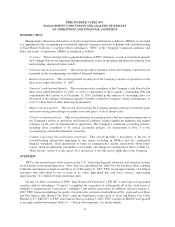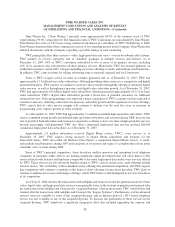Time Warner Cable 2007 Annual Report Download - page 43
Download and view the complete annual report
Please find page 43 of the 2007 Time Warner Cable annual report below. You can navigate through the pages in the report by either clicking on the pages listed below, or by using the keyword search tool below to find specific information within the annual report.currently using on the cable system. On April 14, 2006, TWE-A/N filed a motion for summary judgment, which is
pending. TWE-A/N intends to defend against this lawsuit vigorously.
On June 16, 1998, plaintiffs in Andrew Parker and Eric DeBrauwere, et al. v. Time Warner Entertainment
Company, L.P. and Time Warner Cable filed a purported nationwide class action in U.S. District Court for the
Eastern District of New York claiming that TWE sold its subscribers’ personally identifiable information and failed
to inform subscribers of their privacy rights in violation of the Cable Communications Policy Act of 1984 and
common law. The plaintiffs seek damages and declaratory and injunctive relief. On August 6, 1998, TWE filed a
motion to dismiss, which was denied on September 7, 1999. On December 8, 1999, TWE filed a motion to deny
class certification, which was granted on January 9, 2001 with respect to monetary damages, but denied with respect
to injunctive relief. On June 2, 2003, the U.S. Court of Appeals for the Second Circuit vacated the District Court’s
decision denying class certification as a matter of law and remanded the case for further proceedings on class
certification and other matters. On May 4, 2004, plaintiffs filed a motion for class certification, which the Company
opposed. On October 25, 2005, the court granted preliminary approval of a class settlement arrangement on terms
that were not material to the Company. A final settlement approval hearing was held on May 19, 2006. On
January 26, 2007, the court denied approval of the settlement, and so the matter remains pending. The Company
intends to defend against this lawsuit vigorously.
Certain Patent Litigation
On September 1, 2006, Ronald A. Katz Technology Licensing, L.P. (“Katz”) filed a complaint in the
U.S. District Court for the District of Delaware alleging that TWC and several other cable operators, among
other defendants, infringe a number of patents purportedly relating to the Company’s customer call center
operations, voicemail and/or VOD services. The plaintiff is seeking unspecified monetary damages as well as
injunctive relief. On March 20, 2007, this case, together with other lawsuits filed by Katz, was made subject to a
Multidistrict Litigation (“MDL”) Order transferring the case for pretrial proceedings to the U.S. District Court for
the Central District of California. The Company intends to defend against this lawsuit vigorously.
On July 14, 2006, Hybrid Patents Inc. filed a complaint in the U.S. District Court for the Eastern District of
Texas alleging that the Company and a number of other cable operators infringed a patent purportedly relating to
high-speed data and IP-based telephony services. The plaintiff is seeking unspecified monetary damages as well as
injunctive relief. The Company intends to defend against the claim vigorously.
On June 1, 2006, Rembrandt Technologies, LP (“Rembrandt”) filed a complaint in the U.S. District Court for
the Eastern District of Texas alleging that the Company and a number of other cable operators infringed several
patents purportedly related to a variety of technologies, including high-speed data and IP-based telephony services.
In addition, on September 13, 2006, Rembrandt filed a complaint in the U.S. District Court for the Eastern District
of Texas alleging that the Company infringes several patents purportedly related to “high-speed cable modem
internet products and services.” In each of these cases, the plaintiff is seeking unspecified monetary damages as well
as injunctive relief. On June 18, 2007, these cases, along with other lawsuits filed by Rembrandt, were made subject
to an MDL Order transferring the case for pretrial proceedings to the U.S. District Court for the District of
Delaware. The Company intends to defend against these lawsuits vigorously.
On April 26, 2005, Acacia Media Technologies (“AMT”) filed suit against TWC in the U.S. District Court for
the Southern District of New York alleging that TWC infringes several patents held by AMT. AMT has publicly
taken the position that delivery of broadcast video (except live programming such as sporting events), pay-per-view,
VOD and ad insertion services over cable systems infringe its patents. AMT has brought similar actions regarding
the same patents against numerous other entities, and all of the previously pending litigations have been made the
subject of an MDL Order consolidating the actions for pretrial activity in the U.S. District Court for the Northern
District of California. On October 25, 2005, the TWC action was consolidated into the MDL proceedings. The
plaintiff is seeking unspecified monetary damages as well as injunctive relief. The Company intends to defend
against this lawsuit vigorously.
From time to time, the Company receives notices from third parties claiming that it infringes their intellectual
property rights. Claims of intellectual property infringement could require TWC to enter into royalty or licensing
agreements on unfavorable terms, incur substantial monetary liability or be enjoined preliminarily or permanently
38


